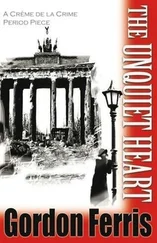With chills and a fever he decamped from the North Side High School practice field as the sun beat down on the varsity team chanting their songs and running their drills at the vast eastern edge of the corn belt.
He woke on the hard curved pew inside a Methodist church, a small white monument to the simplicity and beauty of the Allegheny Jesus. He raised his head off the hymnal and sat up. He felt the fluid overload slowly drain down his limbs.
From the altar the preacher delivered a trial run of his sermon to the empty pews. Tim would have left were it not that he was lethargic and slow on the uptake. Beams of sunlight radiated through the stained-glass windows. He listened to the final ten minutes of the sermon, which concluded, “The wise man’s eyes are in his head; but the fool walketh in darkness: and I myself perceived also that one event happeneth to them all.” He thought he might be hallucinating again, but the preacher came down the aisle and reassured him: the leg cramps that had driven him inside the night before, common among extreme sportsmen, were the result of excessive muscular exertion, which led to inflammation, and to a buildup of a particular enzyme that his body was having difficulty breaking down.
“When that happens,” the preacher continued, “you start to show signs of confusion, have visions, that sort of thing.”
The preacher was seated in the pew in front of him, turned at an angle so they could converse. Were his words intended to put him at ease, or to make matters less certain?
“How do you know all this?” asked Tim.
“I run marathons.”
He was a diminutive, bearded man with a serious face that did not smile falsely. He said he didn’t think Tim was a regular member of the parish, and Tim explained that he was trying to reach New York to reunite with his wife, who was sick. Tim began to speak openly. On other occasions he had wanted to share with men like this the agonies of his circumstances, but it was difficult to overcome the fear that their reactions would be defined by incomprehension and a lack of sympathy, and that he would look weak before them.
“I’m glad to see you returning,” the preacher said when he was through. “It is not good that the man should be alone.”
“No,” he said.
“But I’m curious. Why take such long walks?”
“I don’t take them,” he said. “I’ve told you. They’re forced upon me.”
“But, Tim, this sort of thing doesn’t just happen.”
He had never told the preacher his name.
“You only know my name because I’m hallucinating.”
“I’ve assured you that you’re not hallucinating,” he said. “Now, why do you think you take such long walks?”
“You tell me. They have checked and double-checked the medical textbooks. They’ve searched for others like me, living or dead. I’ve been looking my entire life for just one other similar case.”
“But is there anything whereof it may be said, see, this is new?” The preacher shook his small, round head. “No,” he said. “There is no new thing under the sun.”
“Okay, but I’m telling you: I’m not doing it.”
“So all your life you’ve searched and searched for a rational explanation,” he replied, “while presuming there is one. But if there isn’t?”
“There must be.”
“What is the rational explanation for the bees, Tim? The blackbirds? The fires? The floods? Do those things happen by accident, too?”
Tim stared at him blankly. The preacher finally smiled, in a small but comforting way. He reached over the back of his pew and kindly patted Tim’s knee. Then he came around and helped him to his feet.
He carried on through rain-sodden leaves running in color from copper to yellow. They quivered in the wind with a high-pitched rustle and fell in sloping tumbles to the earth. In the Great Valley, north of the Piedmont region, he passed a lone farmhouse thrashed by a storm. Its roof was gone, its four sides reduced to timbers. A minivan looked as if someone had driven it halfway up the side of the aboveground pool. Lighter household possessions were strewn about as if the farmhouse had been a bag of garbage attacked in the night by a scavenging animal. And standing in the doorway, a child naked but for its diaper cried loudly into the void. A woman was running across the field toward the child. The clouds had dispersed by then. Contrails gone to drift in the upper winds littered the broad blue sky.
His conjunctivitis had come upon him outside Pocatello. It finally healed by Ogallala on the north side of the Platte River and returned on a desolate stretch of Highway 83 between Thedford and Valentine, during a despised detour inside the Nebraska sandhills. Leg cramps had plagued him by basin and range and became unbearable as early as the Laramie Plains. Around the lake region of Ravenna in central Nebraska he began to suffer from myositis, or muscle inflammation, which would lead through an inevitability of biological cause and effect to kidney failure by the time he was hospitalized in Elizabeth, New Jersey, ten miles as the crow flies from his final destination.
His infrequent showering brought on skin complications beyond the painful erosions of chafing and blisters, and in Mount Etna on the northern tip of Lake Icaria in western Iowa, he broke out in shingles that made carrying the pack an exercise in medieval torture. He would finally ditch the pack altogether when his back pain reached a pitch at the foothills of the Appalachian Mountains.
He was bothered by bug bites, ticks, fleas and lice, and after the heat burned off all memory of his participation in the flood that drowned an Iowa town, he let himself fry from Mount Pleasant to the western border of the Mississippi before the sun blisters appeared and he realized it was too late. He fought not very successfully against heatstroke and dehydration across Illinois and most of Indiana until he voided deep orange and finally not much of anything at all. Rhabdomyolysis was on him, medicalspeak for the dangerous elevations of a muscle enzyme released when the body undergoes severe trauma, so that by the time he was bivouacking in the windbreaks of barley, corn and soybean fields, in stands of bushy trees meant to protect crop yields from the unpredictable weather that punished the midwestern plains, his blood was berserk with excess potassium and he was at risk for a ventricular tachycardia that would have taken him faster than a bolt of lightning. Something with the delicacy of chisel and hammer set to splintering the bones down both his legs, a tap, tap, tap with every step, step, step.
The chain gas station with the logo of a dinosaur sold him a map, which he studied out by the propane tank. Everywhere he stopped he filled a cup with ice to soothe his burning tongue. His heels ballooned and forced him to unlace his boots and to walk on his toes which led to higher orders of osteal complications in the charnel house of his body. Beauty, surprisingly, was everywhere, in the wildflowers, the wheat fields, the collapsed barns, the passing trains, the church spires, the stilled ponds, the rising suns.
During another great diversion, from Tylersburg to Punx-sutawney — which required him to cross I-80, his inconstant companion from the Continental Divide to his collapse in New Jersey — he walked past a field discharging one hot air balloon after another into an endless appetite of sky, on the same pink morning he was hit with a head cold. The cold developed into pneumonia with the leathery rales of pleurisy by the time he reached the twin towns of Peapack and Gladstone.
The first tasks of the specialists at the hospital in Elizabeth were to place him on mechanical respiration to fight the acute respiratory distress syndrome, tap and drain the excess fluid from his peritoneal cavity, and put him on dialysis for his liver and heart. His body played a game of touch-and-go with a team of doctors whose tender antagonisms were touching in the extreme. Uncompromising matter did not care for the abuses and insults of heroic stunts. It had the upper hand on practitioners of a medical science who believed they might speak to it fluently and convincingly when in fact they were deaf hostages to a great mocking laughter. They flooded his bloodstream with intravenous meds, fresh plasma and vitamin K, but how could they know if the brain swelling would subside or if he would ever regain consciousness?
Читать дальше












